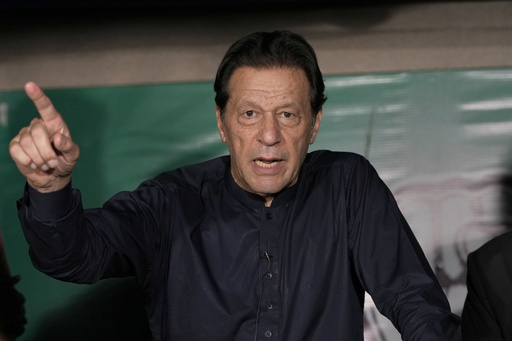
Pakistan’s former Prime Minister Imran Khan speaks during a news conference at his home, in Lahore, Pakistan, Thursday, May 18, 2023. Pakistan is holding elections for a new parliament on Thursday. No less than 44 political parties are vying for a share of the 266 seats that are up for grabs in the National Assembly, or the lower house of parliament, with an additional 70 seats reserved for women and minorities. AP FILE PHOTO
ISLAMABAD — The United Nation’s top human rights body warned Tuesday of a “pattern of harassment” against members of former Pakistani Prime Minister Imran Khan’s party ahead of this week’s parliamentary election.
During a news briefing in Geneva, Liz Throssell, spokesperson for the UN High Commissioner for Human Rights, urged Pakistani authorities to ensure a fully free and fair voting process.
This came amid complaints by Khan’s Pakistan Tehreek-e-Insaf party of harassment and the inability to hold rallies similar to the former ruling party and its candidate Nawaz Sharif. Authorities have denied such claims.
READ: Pakistan ex-PM Imran Khan and wife jailed for 7 years for unlawful marriage
Khan has been sentenced to 34 years in jail after being convicted in four cases and has been disqualified from running. His party and supporters claimed the sentencing was a punishment for his rhetoric against Pakistan’s powerful military.
Throssell said the U.N.’s rights body was disturbed “by the pattern of harassment, arrests and prolonged detentions of leaders” of Khan’s party and its supporters.
She said all eligible parties in Pakistan must be able to compete fairly.
“Ahead of Thursday’s parliamentary election in Pakistan, we deplore all acts of violence against political parties and candidates, and urge the authorities to uphold the fundamental freedoms necessary for an inclusive and meaningful democratic process,” she said.
She said the upcoming elections are also a “reminder of the barriers faced by women and minority communities in Pakistan, particularly the Ahmadis.”
Pakistan declared the Ahmadis non-Muslims in 1974, they are recorded on separate voter rolls from other citizens. Throssell said that these separate voter lists exposes them to violence.
READ: Pakistan’s ex-PM Khan gets 14-year prison in third conviction
In recent months radical Islamic extremists have attacked Ahmadi places of worship and even graveyards. Ahmadis have claimed that some of the attacks happened in the presence of police.
Mumtaz Zahra Baloch, a spokesperson for Pakistan’s Foreign Ministry, said in a statement that “Pakistan is fully committed to foster an inclusive democratic process, uphold the rule of law, and protect human rights and fundamental freedoms guaranteed in its laws and Constitution.”
She said the judicial system in Pakistan provides for fair trial and due process. “Domestic legal remedies are available in case of any complaints in the electoral process,” she said.
Throssell also noted that some political parties have not met the legal quota for female representatives. Pakistan reserves 22% of seats in Parliament for women.
On Tuesday, caretaker Interior Minster Gohar Ijaz said that all arrangements were in place to ensure a free and fair election despite a recent surge in militant attacks, adding that troops would be deployed in sensitive areas.
The campaigning is set to end by midnight local time Tuesday, but candidates are still allowed to lobby for votes door-to-door.
Pakistan has invited international observers to monitor the election, though some analysts say the vote’s credibility is at stake due to “pre-poll rigging” and the rejection of the candidacies of Khan’s party.
Amnesty International, among several other human rights organizations, urged authorities to “guarantee uninterrupted access to the internet and digital communication platforms for everyone across the country” after Ijaz said internet disruptions were a possibility during Thursday’s election if local authorities requested it.
Internet is usually suspended in Pakistan to restrict communication among militants following attacks.
The balloting comes as Pakistan is mired in political feuding and an economic crisis gripping the country.
With Khan out of the picture, there seems to be only one top contender for the post of premier — Nawaz Sharif, a three-time ex-prime minister who has returned to the country and been absolved of past convictions.
Sharif, as well as his seemingly main competitor, Bilawal Bhutto-Zardari, son of the assassinated premier Benazir Bhutto who heads the Pakistan People’s Party, addressed rallies on Tuesday, making competing claims that their parties were expected to win the vote.